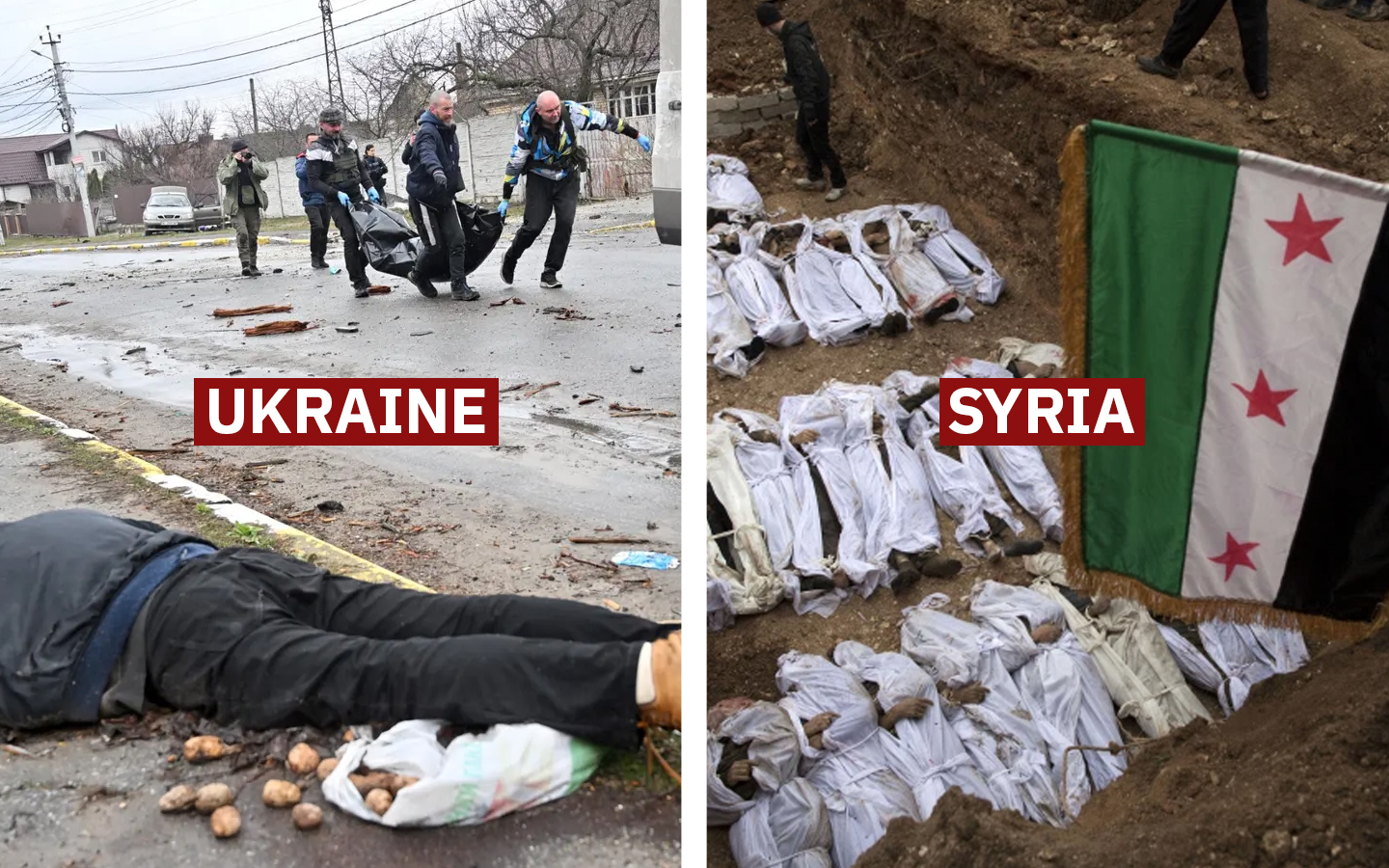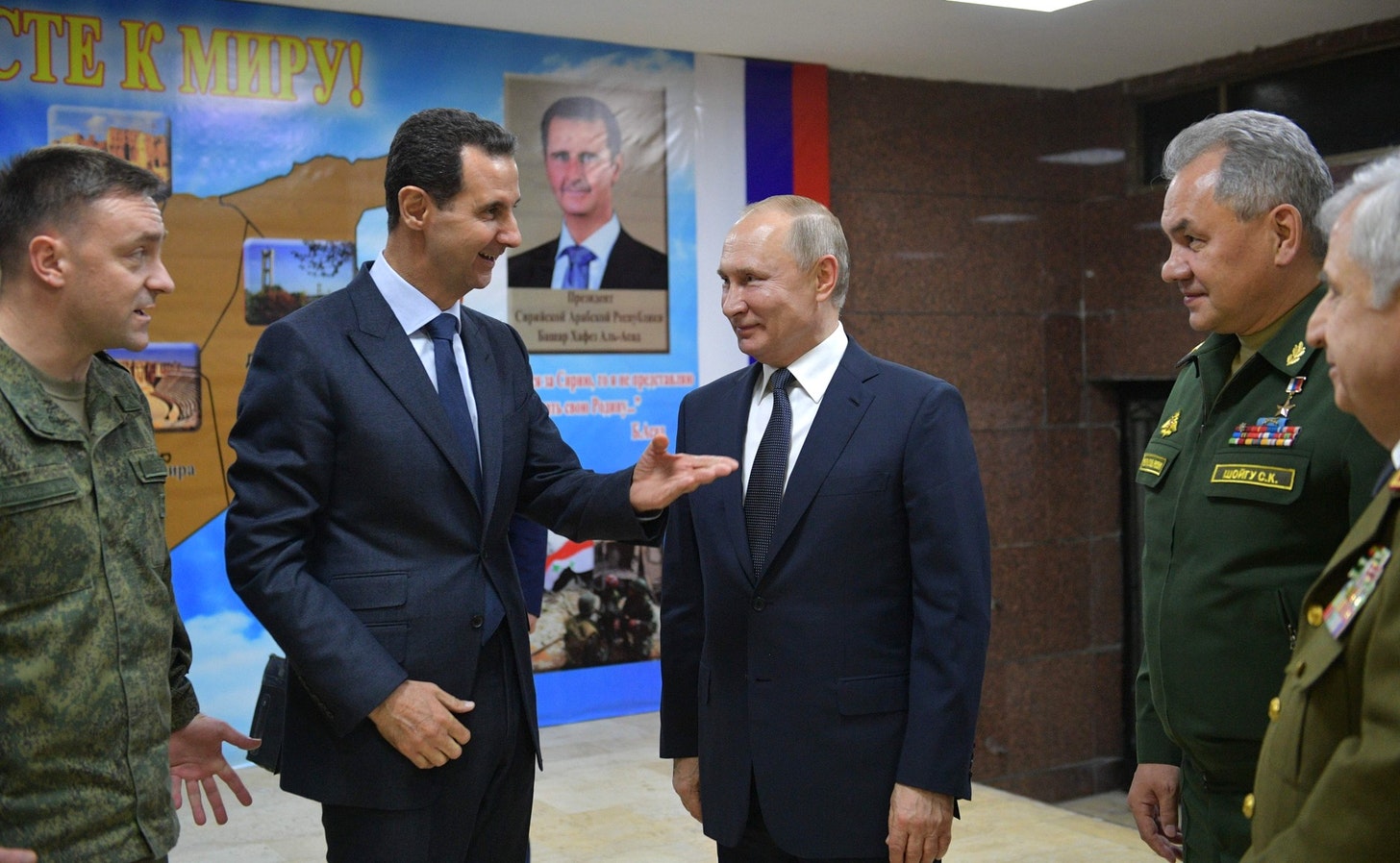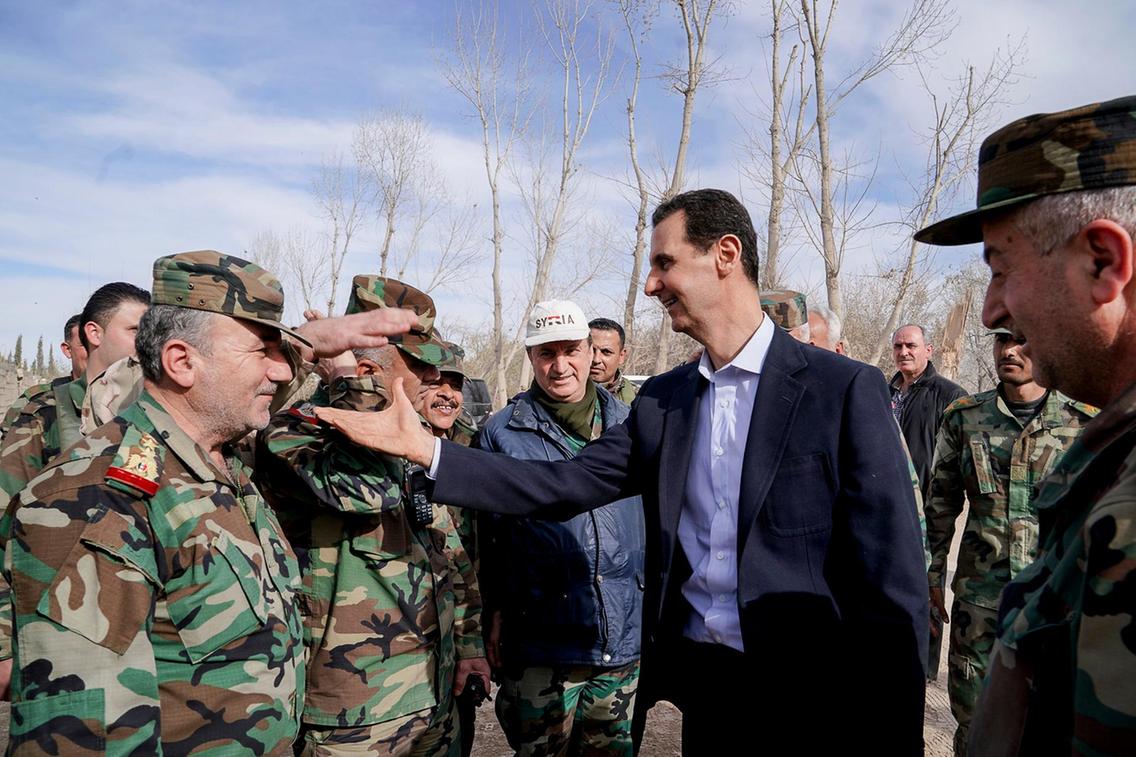After 11 Years of Criminality: Why Is the Assad Regime Not Punished for Its Horrific Crimes Against Syrians?

The escalation of the war in Ukraine has once again highlighted the massacres and horrific war crimes committed by the regime of Syrian President Bashar al-Assad, an ally of Russian President Vladimir Putin, against defenseless civilians over the past years.
However, the double standards of the West once again raised questions about whether the international community needs new scenes documenting the horrific massacres of Syrians to punish the Assad regime and its supporters.
The massacre committed by the regime in a neighborhood of Damascus eight years ago, which the Guardian newspaper recently revealed, constituted an issue of public opinion among the Syrian and international media and human rights circles, through the enormity of the scenes in the video attached to the investigation.
Since the start of the Syrian revolution in March 2011, the Assad regime has continued to exercise the option of a military solution, which claimed the lives of hundreds of thousands of civilians, and forced more than half of the Syrian people to flee or seek refuge, in addition to the tragedies of killing, destruction, and arrest.
On the other hand, the international community is still concerned, without taking a step, about the accountability of criminals and murderers whose crimes are documented, which raises many questions about the real frameworks that define laws and agreements to protect civilians during wars.
Genocide and Mass Persecution
A video published by the Guardian newspaper on April 27, 2022, documenting mass executions carried out by pro-Assad elements, provoked wide reactions and echoes with the horror of the scenes it contained, bringing back to the fore hundreds of leaked videos when regime elements took pleasure in torturing Syrians to death.
The newly leaked video shows members of the District branch of the Military Intelligence Division, also known as Branch 227, carrying out a massacre and cremation against unarmed civilians in a neighborhood of the capital, Damascus.
“The massacre took place in the al-Tadamon neighborhood in southern Damascus on April 16, 2013, several miles from the headquarters of Bashar al-Assad, and that at least 41 men were killed in that mass grave, then the officers poured fuel on their remains, and set fires while laughing,” the newspaper said.
The Guardian described the incident as ‘a hidden war crime’ that has been covered up for years, referring to the statements of the chair of the Independent International Commission of Inquiry on Syria, Paulo Pinheiro, last March, in which he said that more than 100,000 people are still missing or forcibly disappeared.
The newspaper also revealed that “genocide and mass persecution are part of a systematic policy pursued by the Assad regime that includes sexual violence, where rape is used as a punishment and a mechanism of humiliation for civil society, as well as the exploitation of the population in digging tunnels and building barriers, leading to economic repression through the confiscation of civilian property.”
The Guardian's latest investigative writer, Martin Chulov, said: “This footage is one of the most indictable videos from the whole Syrian conflict and gives us a glimpse into a previously untold part of the 10-year war.”
How the hunter became the hunted in #Syria. A story of online sleuthing, a virtual seduction & a dogged pursuit of justice that reeled in the perpetrator of one of the war's worst massacres. With a fantastic podcast by @safimichael & @alexatackonline 1/2 https://t.co/14ZsYkngYj
— Martin Chulov (@martinchulov) April 27, 2022
According to an extensive investigation published by the American magazine New Lines, the video of the al-Tadamon neighborhood massacre is one of 27 leaked videos, which show the killing of 288 civilians, including 7 women and 12 children, at the hands of members of the 227 branch of Assad's intelligence.
Commenting on the al-Tadamon neighborhood massacre, Syrian lawyer and human rights defender, Abdel Nasser Hoshan said in a statement to Al-Estiklal: “This crime is not the first in a series of crimes that the Assad regime committed and continues to commit.”
“These crimes are not individual actions or mistakes, but rather a systematic behavior and policy run by the regime, and the order to implement them is entrusted to sectarian criminal killers, with the aim of purifying Syrian neighborhoods that consist of a sectarian mix,” he added.
Mr. Hoshan concluded that “the effects of these crimes will not go away in the short term, but require many years of planning and work; its first step is to get rid of this criminal Assad regime, then achieve transitional justice, hold the criminals accountable, and give justice to the victims. Otherwise, we are on the verge of a grinding civil war.”
Delayed Justice
In an interview with the Dutch newspaper Trouw, last March, French Judge Catherine Marchi-Uhel, who seeks to collect evidence on behalf of the UN of war crimes committed in Syria, 11 years after the outbreak of the war, clarified the mechanisms of her work and her team in documenting, extracting evidence and presenting it to the International, Impartial and Independent Mechanism (III-M), which has so far assisted in 96 investigations in 13 different countries.
“The situation in Syria is serious…crimes have been committed for more than a decade, and such a case is usually referred to the International Criminal Court. However, so far there is no international court to deal with Syrian war crimes, despite documenting shocking statistics,” the judge said.
Ms. Marchi-Uhel also expressed her anger and frustration at the political blockade that prevents any international courts from dealing with crimes in Syria, considering the Syrian war the most documented conflict since World War II.
The International Criminal Court in The Hague has already been asked to investigate Syrian war crimes, but those efforts have repeatedly failed due to Russia and China's veto of the UN Security Council.
The III-M was established in 2016 by the UN General Assembly and entrusted with the task of collecting, storing, and analyzing evidence of international crimes committed in Syria since 2011, in order to assist in the prosecution of the perpetrators of these crimes.
Ms. Marchi-Uhel knows from her many years of experience that patience pays off, especially when she worked for the International Criminal Tribunal for the former Yugoslavia between 2011 and 2015. She did not expect to arrest the leaders, but Bosnian Serb General Ratko Mladic was extradited to The Hague in 2011.
“Political alliances change, situations change. It may take some time. But these crimes do not have a statute of limitations, like ordinary crimes... Delaying justice is not the same as denying justice,” she said.
CBS News had hosted, in an exclusive interview, presented on February 21, the chair of the Commission on International Justice and Accountability, Stephen Rapp, who revealed that his organization possessed more than 900,000 government documents that had been smuggled, containing evidence exposing the practices of the Syrian regime and the violations it committed during the past ten years.
Mr. Rapp added that “the name of Bashar al-Assad was present in the documented reports in which violations against the Syrian people took place, which indicates that al-Assad was organizing this strategy,” and described these violations as an organized effort.
According to Rapp, the documented evidence against the Assad regime and its supporters is better than the evidence found against Milosevic's crimes in Yugoslavia, or the Nazis in Nuremberg, because the Nazis did not take individual photographs of all their victims with identifying information about them.
With regard to achieving justice in Syria, Mr. Rapp indicated that he is optimistic about the large number of cases that he previously thought were largely hopeless, but that they achieved justice to some extent, indicating that all possibilities exist in his opinion.
From the point of view of lawyer Abdel Nasser Hoshan, the paths of international justice are limited to two paths namely the International Court of Justice, which is competent to try governments, but does not impose penal sanctions but rather compensation, in addition to the fact that the decisions of this court are not binding on the parties.”
“As for the second path, it is the International Criminal Court, which specializes in trying individuals, and imposes penal sanctions and compensation, but it is governed by a complex mechanism as it needs a referral from the Security Council or from a state that is a signatory to the Rome Statute...,” he added.
The lawyer also emphasized that “through the foregoing, we find that the reasons for obstructing international justice lie in the unwillingness of the international community to refer the Syrian war crimes file to the International Criminal Court on the one hand, and on the other hand, Russia and China used their veto power to block any decision in this regard. “
However, the veto can be bypassed by resorting to the General Assembly based on its resolution (United for Peace), which was activated in condemning the Russian aggression against Ukraine.
“Therefore, we see that the international community is trying to restore confidence in it and in international justice by resorting to economic sanctions to pressure the Assad regime to change its criminal behavior instead of holding it accountable. Unfortunately, this gave the regime and its gangs a green light to continue killing and torturing Syrians. The international community is still brandishing these crimes without showing any serious desire to hold the regime accountable,” Mr. Hoshan added.
Echoes of the Massacre
In response to the echoes of the investigation published by the Guardian, the State Department spokesperson stressed in a press statement on April 29 that “the United States is committed to holding the Syrian regime accountable for the atrocities it has committed against its people.”
“The Syrian regime is responsible for the death and suffering of countless Syrians, and the displacement of more than half of the country's population, in addition to the continued arbitrary detention and enforced disappearance of more than 130,000 men, women, and children,” he also stressed.
He pointed out that without accountability, there can be no lasting solution to the Syrian conflict, adding, “We support the important role of the investigation committee and the international, impartial and independent mechanism. We welcome the ongoing efforts of national courts to investigate and prosecute crimes within their jurisdiction committed in Syria.”
In turn, the Syrian National Coalition confirmed in a statement on April 28 that what was leaked by the Guardian newspaper is only one of the thousands of bloody massacres carried out by the Assad regime and its allies against the Syrian people, adding, “What was known to the Syrians has become visible and available to the whole world.”
The coalition pointed out that “this massacre committed in the al-Tadamon neighborhood in Damascus is a fully integrated war crime, the perpetrators are known and clearly defined. It and similar documented crimes call for a fair accountability of the Assad regime in the International Criminal Court.”
The coalition questioned the position of the international community, led by the United States and the European Union, their reaction to this crime, and how they would deal with it if it occurred in Ukraine now.

Syrian activists also criticized the international way of dealing with the Assad regime, and the reasons behind the lack of accountability so far, despite there being a lot of evidence, such as Caesar photos, and recordings of chemical attacks and mass graves.
In this context, lawyer Abdel Nasser Hoshan said in a statement to Al-Estiklal: “Unfortunately, double standards are a systematic policy of the West, and this was confirmed by the way he dealt with the Russian aggression against Ukraine; so the doors of the UN General Assembly and the Security Council were open for them to obtain resolutions condemning the aggression, and opening the doors to the accountability of the Russian regime before the International Court of Justice and the International Criminal Court.”
He pointed out that “the Syrian file had witnessed terrible neglect in recent years, especially after the Russian military intervention in September 2015.”
Finally, Mr. Hoshan called on the Syrian opposition and human rights organizations to develop a plan to bring the Syrian file back to the fore by linking the war crimes file in Ukraine and Syria with each other under the rule of (indivisible justice) and (no impunity for criminals), in addition to increasing pressure on the double standards applied by the West with regard to war crimes and targeting civilian lives.
Sources
- Massacre in Tadamon: how two academics hunted down a Syrian war criminal
- How a Massacre of Nearly 300 in Syria Was Revealed
- The evidence of Syrian President Bashar Assad and his regime's legacy of war crimes
- On Guardian Newspaper’s Revelation of Horrific Assad Regime’s Crime in Tadamon Suburb
- This judge seeks evidence for war crimes in millions of videos [Dutch]
- The US State Department comments on the investigation of the Al-Tadamon neighborhood massacre in the vicinity of Damascus [Arabic]









